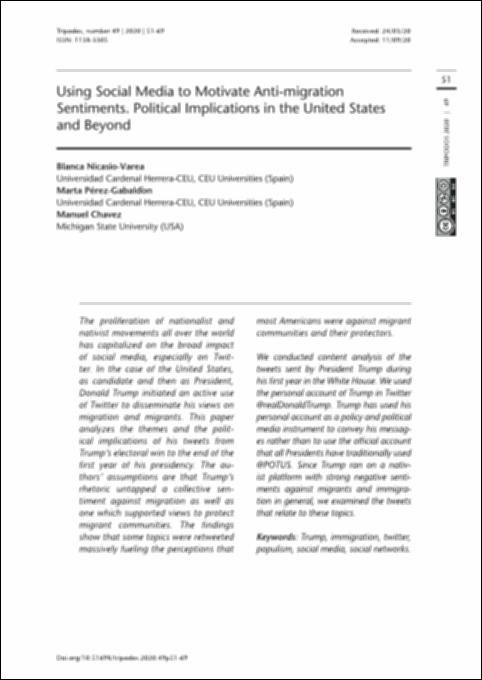Please use this identifier to cite or link to this item:
http://hdl.handle.net/10637/12782Using social media to motivate anti-migration sentiments : political implications in the United States and beyond
| Title: | Using social media to motivate anti-migration sentiments : political implications in the United States and beyond |
| Authors : | Nicasio Varea, Blanca Pérez Gabaldón, Marta Chávez Márquez, Manuel |
| Keywords: | Trump, Donald J., 1946- - Crítica e interpretación.; Trump, Donald J., 1946- - Criticism and interpretation.; Twitter (Red social) - Análisis de contenido - Estados Unidos.; Social networks - Content analysis - United States.; Comunicación social - s. 21 - Estados Unidos.; Twitter (Social network) - Content analysis - United States.; Lenguaje político - s. 21 - Estados Unidos.; Politics - Language - 21st century - United States.; Social media - 21st century - United States.; Communication in public administration - 21st century - United States.; Comunicación en la administración pública - s. 21 - Estados Unidos.; Populism - 21st century - United States.; Redes sociales - Análisis de contenido - Estados Unidos.; Populismo - s. 21 - Estados Unidos.; Estados Unidos - Emigración e inmigración - Política y gobierno.; United States - Emigration and immigration - Politics and government. |
| Publisher: | Universitat Ramon Llull, Facultad de Comunicación y Relaciones Públicas Blanquerna. |
| Citation: | Nicasio Varea, B., Pérez Gabaldón, M. & Chavez, M. (2020). Using social media to motivate anti-migration sentiments : political implications in the United States and beyond. Trípodos, n. 49 (05 feb.), pp. 51-69. DOI: https://doi.org/10.51698/tripodos.2020.49p51-69 |
| Abstract: | The proliferation of nationalist and nativist movements all over the world has capitalized on the broad impact of social media, especially on Twitter. In the case of the United States, as candidate and then as President, Donald Trump initiated an active use of Twitter to disseminate his views on migration and migrants. This paper analyzes the themes and the political implications of his tweets from Trump’s electoral win to the end of the first year of his presidency. The authors’ assumptions are that Trump’s rhetoric untapped a collective sentiment against migration as well as one which supported views to protect migrant communities. The findings show that some topics were retweeted massively fueling the perceptions that most Americans were against migrant communities and their protectors. We conducted content analysis of the tweets sent by President Trump during his first year in the White House. We used the personal account of Trump in Twitter @realDonaldTrump. Trump has used his personal account as a policy and political media instrument to convey his messages rather than to use the official account that all Presidents have traditionally used @POTUS. Since Trump ran on a nativist platform with strong negative sentiments against migrants and immigration in general, we examined the tweets that relate to these topics. |
| Description: | Este artículo se pertenece al monográfico que lleva por título "Communication flows in the European elections: amid populism and euroscepticism". Este artículo se encuentra disponible en la siguiente URL: http://www.tripodos.com/index.php/Facultat_Comunicacio_Blanquerna/article/view/705/859 |
| URI: | http://hdl.handle.net/10637/12782 |
| Rights : | http://creativecommons.org/licenses/by-nc-sa/4.0/deed.es |
| ISSN: | 1138-3305. 2340-5007 (Electrónico). |
| Issue Date: | 5-Feb-2020 |
| Center : | Universidad Cardenal Herrera-CEU |
| Appears in Collections: | Dpto. Ciencias Políticas, Ética y Sociología |
Items in DSpace are protected by copyright, with all rights reserved, unless otherwise indicated.


